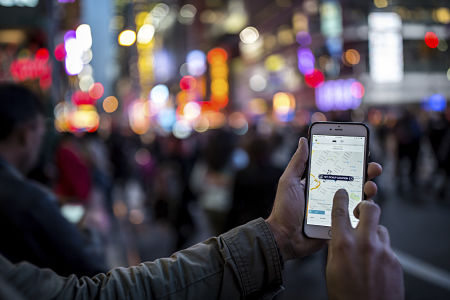On December 30, Uber announced it had booked its one billionth trip, a Christmas Eve ride in London.
The landmark trip came five years after the company launched its first ride in San Francisco in 2010.

The taxi/limo industry will never be the same.
Uber is the undisputed king of the ride-hailing universe, now valued at $64.6 billion, according to Bloomberg.
Lyft, its only real competitor, is valued at $4.5 billion. Sidecar, a smaller competitor operating in 10 cities, shut down in December.
Both companies are squaring off in the fundraising arena, raising new cash from investors. Uber is currently seeking another $2.1 billion in investment capital and Lyft is seeking another $1 billion in funding.
Uber, which has more of a global footprint than Lyft, has expanded to hundreds of cities in 68 countries. Uber has also expanded into package and food delivery services.
Lyft, which has remained focused on the U.S. market, currently operates in more than 200 U.S. cities.
The emergence of riders summoning a ride through a smartphone app has turned the traditional taxi and limousine industry upside down.
Taxi and limo companies and operators are crying foul, saying that Uber and Lyft drivers are not required to have the same insurance and background checks as their drivers, allowing the newcomers to “skim” business without making the same investment they had to make.
In early December, the Seattle City Council took a stand, voting unanimously to allow drivers from Uber and Lyft, as well as traditional taxis, to unionize and collective bargain employment terms and benefits with the companies.
“We’ve heard from Seattle drivers making sub-minimum wage, and companies like Uber have turned a deaf ear to their concerns. This bill was only introduced out of necessity after witnessing how little power drivers themselves had in working for a living wage,” said Councilmember Mike O’Brien.
The issue comes down to the distinction between an employee and an independent contractor.
Uber and Lyft believe that a new 1099 economy, the independent contractor designation, allows freedom for contractors, eliminating the need for employee status or unions.
Uber says 69 percent of their drivers have other part or full-time work in addition to driving for the company and half of their drivers drive fewer than 10 hours per week on average.
Lyft released a statement disagreeing with the Seattle decision.
“Lyft drivers are entirely in control of where or when they work, and this flexibility is exactly why the service is so popular with people looking to make extra income,” the company said.
“Unfortunately, the ordinance passed today threatens the privacy of drivers, imposes substantial costs on passengers and the City, and conflicts with longstanding federal law. We urge the Mayor and full Council to reconsider this legislation and listen to the voices of their constituents who choose to drive with Lyft because of the flexible economic opportunity it offers.”
In Florida, Hillsborough County is pushing for state legislation that would require minimum insurance, background checks and vehicle safety standards. Several other Florida lawmakers have filed similar bills.
Hillsborough County Commissioner Victor Crist says if the state cannot deal with the issue his county will.
“We have a way of legalizing Uber and Lyft, and putting basic safety requirements in place in a way the courts will back and which we don’t have now,” Crist said. “In return, it will minimize the rules and restrictions on our cabs and provide an opportunity for them to sell back their permits to pay back their mortgages.”
Taxi companies argue that Uber and Lyft are playing the game without the adhering to the rules. Cab companies pay from $45-65,000 a year for permits and another $100,000 per year for access to Tampa International Airport.
Uber and Lyft drivers are not operating under the same requirements; the cab companies say.
In cities where they are allowed to pick up airport passengers, such as Washington, D.C., and New York, the ride-hailing companies pay a flat fee.
Hillsborough County’s proposed legislation and statewide proposals call for a sliding scale of insurance with $50,000 coverage for death and bodily injury per passenger and $100,000 per incident and $25,000 for property damage when drivers are logged into the ride-hail app.
Florida lawmakers say current Uber and Lyft drivers are using a surplus lines insurance carrier which is not regulated in the state.
